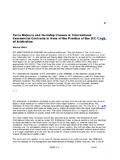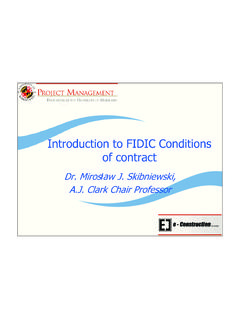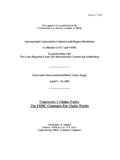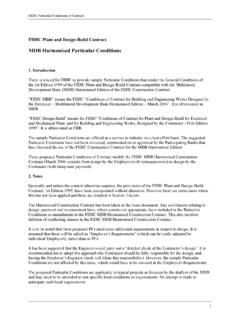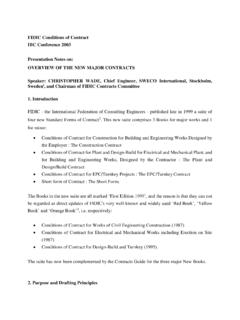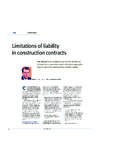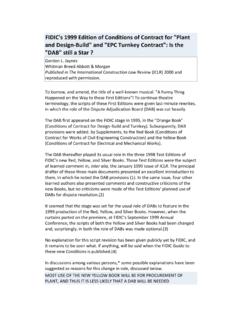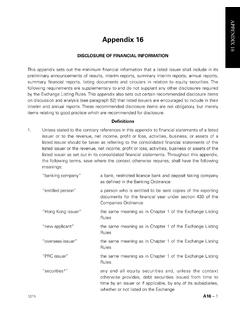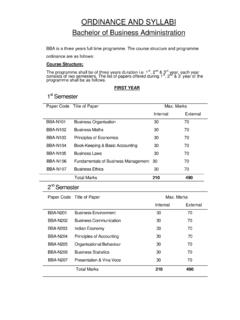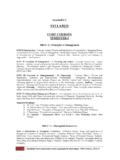Transcription of The ICC Uniform Rules for Demand Guarantees …
1 The ICC Uniform Rules for Demand Guarantees (& quot ;URDG& quot ;) in Practice: A Decade of Experience A Contractor's View of the URDG Christopher R. Seppala Partner,White & Case LLP, Paris and Legal Advisor, FIDIC Contracts Committee (1) Presented at the ICC Conference, Paris; 15 May 2001 I. Introduction I have been asked to comment on the ICC's Uniform Rules for Demand Guarantees (ICC Publication no. 458) (the & quot ;URDG& quot ; or & quot ; Rules & quot ;) from the point of view of the exporter or contractor or principal. I will in fact speak from the point of view of a contractor in relation to an international construction project as this is what I am most familiar with. At the same time, a contractor's position is unlikely to differ radically from that of other exporters who find themselves obliged to provide an on Demand guarantee in relation to an international commercial contract.
2 No one likes to be punished who has done nothing wrong. For the same reason, no contractor wants to provide a guarantee which can be called when he has not been at fault. Yet that risk is inherent in an on Demand guarantee as, in its pure form, it is callable simply upon Demand , not upon the contractor's default. Even under the Rules , the guarantee is callable merely upon the beneficiary's statement that the contractor is in breach of a contract and of the respect in which the contractor is in breach. Even if the beneficiary is wrong, the guarantee must be paid. In effect, such a guarantee is a substitute for a cash deposit by the contractor with the owner. Consequently, in principle, contractors do not favor on Demand Guarantees . However, since the 1970s, the reality of the international construction business has been that owners have insisted that contractors provide such Guarantees and, to compete, contractors have generally had no alternative but to do so.
3 Today, on Demand Guarantees are a fact of life in international construction, whether contractors like it or not. Numerous efforts have been made at the international level to try to temper the harshness of such Guarantees . Thus, in 1978, the ICC issued Uniform Rules for Contract Guarantees (ICC Publication no. 325), which are to be clearly distinguished from the URDG or Uniform Rules for Demand Guarantees (ICC Publication no. 458). These 1978 Rules required the production of a judgment or an arbitral award as a condition of the beneficiary's right to payment. (2) However, these Rules were unacceptable to owners who insisted on a guarantee that was immediately enforceable. Hence, these Rules were rarely used. Consequently, to try to respond to the demands of owners, while at the same time trying to limit unfairness to contractors, the ICC developed the Rules which, according to the introduction to the Rules , are said to & quot ;reflect more closely the different interests of the parties involved in a Demand guarantee transaction& quot ;.
4 (3) Are the Rules acceptable to contractors? The Rules fall far short of what, in an ideal world, a contractor might consider acceptable. Unquestionably, they represent a compromise among the competing interests of the parties concerned: the owner, the contractor and banks. Nevertheless, I think they are good Rules from the contractor's point of view because they have achieved, as far as practicable, I believe, a fair balance among the parties (without which, no set of Uniform Rules in this area has any chance of acceptance), because they do moderate the severity for the contractor of a & quot ;pure& quot ; on Demand guarantee and because Uniform Rules which address the numerous issues that arise in the complex area of Demand Guarantees (4) are in the interests of all parties.
5 Accordingly, I strongly endorse the Rules . II. Comments on the URDG Having said that, I shall comment briefly on the Rules , on behalf of the contractor, starting from the beginning of the Rules and going through to the end. I have basically six comments, as follows: First, there seems to be the risk of a contradiction between the description of the beneficiary on page 5 and the very broad definition of a & quot ; Demand guarantee & quot ; on page 8. The description of the beneficiary on page 5 provides: & quot ;The beneficiary wishes to be secured against the risk of the principal's not fulfilling his obligations towards the beneficiary in respect of the underlying transaction for which the Demand guarantee is given. The guarantee accomplishes this by providing the beneficiary with quick access to a sum of money if these obligations are not fulfilled.
6 & quot ; [Emphasis added] On the other hand, the definition of a Demand guarantee in Article 2(a) on page 8 includes & quot ;a written Demand for payment& quot ; accompanied by, for example, & quot ;a judgment or an arbitral award& quot ;. As a practical matter, an arbitral award or judgment is likely to take years to obtain. Accordingly, I suggest either to delete the word & quot ;quick& quot ; in the description of the & quot ;beneficiary& quot ; on page 5 or to delete the reference to & quot ;judgment or an arbitral award& quot ; in Article 2(a). I would delete the reference to & quot ;judgment or an arbitral award& quot ;. I say this not merely to eliminate a contradiction but also because, since the ICC published the Rules in 1992, we now have new procedures for the settlement of disputes in international construction contracts which can be referred to and which I think can be used to ameliorate the problem of the first Demand guarantee for the contractor.
7 I refer to the procedure that is called & quot ;expert determination& quot ; or & quot ;adjudication& quot ;. Thus, the new FIDIC conditions for international construction contracts, adopted in 1999 (and which, incidentally, incorporate model forms of guarantee based on the URDG), (5) provide for the settlement of disputes initially by a Dispute Adjudication Board. The decision of such Board, which is provisionally binding upon the parties (it may be referred to arbitration), must be rendered within 84 days. Accordingly, there is no reason why the parties could not agree that any call on a Demand guarantee must be accompanied by a decision from the Dispute Adjudication Board stating that the contractor is in breach of contract and the amount of damages resulting from the breach.
8 Owners are much more likely to accept that a call on a Demand guarantee be accompanied by the decision of a dispute adjudication board than by an arbitral award or court judgment. Accordingly, in the case of a call of an on Demand guarantee under an international construction contract, parties should in future consider requiring the owner to produce a decision in its favor of the Dispute Adjudication Board and I think the ICC's literature on the Rules should refer to this possibility. Second, as a contractor, I would be glad to see that, under Article 4, first paragraph, a beneficiary's right to make a Demand under a guarantee is normally not assignable. When agreeing to provide for issuance of an on Demand guarantee , a contractor is doing so in light of the particular identity of the owner or beneficiary.
9 He is weighing the risk of an abusive call by that beneficiary and no other. Accordingly, it is vitally important that the beneficiary not be able to assign the right to make a Demand to another person without the contractor's consent. Third, while it is understandable that the URDG contains provisions designed to protect guarantors and instructing parties (essentially banks) from liability in certain instances, Article 13 goes too far in providing that they shall have no liability or responsibility for consequences arising out of & quot ;strikes, lockouts or industry actions of whatever nature& quot ; (emphasis added). They should not be relieved of liability for & quot ;strikes, lockouts or industry actions& quot ; that involve their own personnel. These are matters that banks can control or should be able to control.
10 Accordingly, these kind of industrial actions should be expressly excluded from an exculpatory provision like Article 13. Otherwise, Article 13 would be unbalanced in favor of banks. Fourth, on behalf of the contractor, I am naturally pleased that, under Article 17, in the event of a Demand , the guarantor must & quot ;without delay& quot ; inform the principal (the contractor) or, where applicable, his instructing party (such as a bank who has given a counter- guarantee ), and in that case the instructing party shall inform the principal (the contractor) (Article 17). This provision, when coupled with the provision in Article 10 that the guarantor shall have a & quot ;reasonable time& quot ; within which to examine a Demand and to decide whether to pay, are perhaps the most important provisions in the new Rules from the point of view of the contractor.
